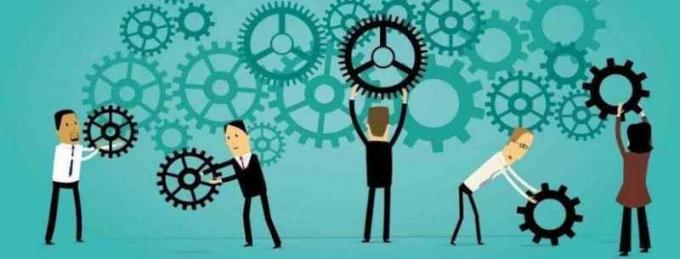Management: Definition, Function, Purpose, Elements, Types
A person can carry out a task or responsibility in a disciplined manner because of management. What does management actually mean?
Because without such management, someone will find it difficult to do their duties and responsibilities.
To find out more about management you can listen to the following article.
Table of contents
Understanding Management in General

Management is a process in which a person can manage everything that is done by individuals or groups.
This management itself needs to be done, in order to achieve the goals or targets of the individual or group cooperatively with existing resources.
An organization or company will run well if the management in it is also organized and conducive.
So management is one very important element, both for individuals and groups.
Management can also be interpreted as a person's ability to manage something so that the goals he will achieve can be achieved.
So the meaning of management in short is to regulate.
Understanding Management According to Experts

Experts express their opinions regarding the definition of management, including the following:
1. George Robert Terry
Management is a typical process of several actions. Examples include planning, organizing, mobilizing, and controlling.
All examples of these actions aim to achieve the target by utilizing all available resources.
2. Hilman
Management is a function to achieve a target through intermediaries, as well as carry out supervision. In this way, goals can be achieved together.
3. Lawrence A. Appley
Management is a skill in getting other people to be willing to do something.
It doesn't have to be a person, management skills can also be owned by groups or organizations.
4. Mary Parker Follette
Management is the art of getting tasks done through an intermediary.
In this case, management can be interpreted as an activity carried out by superiors who direct their subordinates to complete work in order to achieve a goal.
5. Ricky W. Griffin
Management is the process of planning, organization, coordination, and control of resources so that goals are achieved effectively and efficiently.
What is meant by effective here is that the objectives are achieved according to plan and what is meant by efficient means that management is carried out carefully, organized, and timely.
Management Function

Management has several functions, including the following:
1. Planning Function
Planning is the first thing that must be done by a leader or business maker.
With planning, the leader can evaluate all actions, both those that have been carried out and those that have not been carried out.
Without careful planning, the objectives of management activities will not be achieved.
2. Organizing Function
This function has the aim of facilitating the supervisory process carried out by a leader.
3. Placement Function
Here a leader has the task of placing available resources according to need.
Thus, the process of achieving goals can be carried out more effectively and efficiently.
4. Briefing Function
This briefing is an effort so that the plans that have been made can run smoothly.
So this direction needs to be done so that everything that is done can run according to the directions and plans.
5. Oversight function
The purpose of this supervision is so that management activities can take place as planned.
If it does not go well, then management activities can be directly evaluated.
Management Goals

Everything must have a purpose, as well as management. There are several management objectives, including the following:
- Implement and evaluate the chosen strategy effectively and efficiently.
- Evaluating performance, reviewing, and reviewing the situation and making various adjustments and corrections if there are deviations in strategy implementation.
- Always review the strengths, weaknesses, opportunities, and threats of existing opportunities.
- Always innovating on activities so that we live more regularly.
- Always updating the strategies we formulate to suit the development of the external environment.
Management Element

In general, there are 6 elements in management that must be positioned equally, namely 6M.
What is 6M? 6M is Man, Money, Material, Machine, Method, Market.
1. man
Man is human. In management activities there must be human resources.
Humans who will make plans and goals to be achieved. So without humans, management activities will never exist.
2. Money
Money is money. Money is also an important element in management activities.
Because money is the main intermediary in achieving goals. Operational costs in management activities must use money.
3. Material
This management element is also an important factor because the quality of the business is influenced by the quality of the selected material.
So, if the selected material is poor, management goals will be difficult to achieve.
4. Machine
Don't forget to use the machine too. Because with the machine, human work becomes easier.
Thus the goal can be achieved quickly.
5. Method
The method can be interpreted as the method used in carrying out the work or management activities.
A good method always takes things into account.
6. Market
This last element is quite crucial because a business can only grow if it is known in the market.
The market element itself is influenced by the material element because the goods or services that sell must have good quality.
Types of Management Studies

There are various types of management science, including the following:
1. Human Resource Management
Human resource management is management that is used to regulate the relationship and role of owned resources.
In addition, this management can also handle various problems in the scope of managers, employees, employees, laborers, and other workers to be able to support the activities of the organization and company.
2. Stress Management
Stress management is the ability to use human resources effectively to cope with mental and emotional disorders.
3. Strategic Management
Strategic management is a person's ability to formulate, implement, and evaluate decisions.
Management is also an action that can be used to formulate and implement a strategy.
4. Time Management
Time management is the ability to plan, organise, mobilize, and monitor productivity over time.
5. Financial management
Financial management is the ability to organize the activities of planning, budgeting, managing, controlling, searching, storing, and checking funds owned by an organization or company.
6. Process Management
Process management is the ability to create or delete processes created by users or systems, suspensions, and assumptions.
In addition, this management is also for the creation and elimination of complete mechanisms for deadlock control and complete mechanisms for process synchronization.
7. Production Management
Production management is the ability to coordinate various activities to achieve a goal.
8. Marketing Management
Marketing management is the capability for product development, distribution strategy, pricing of product and service delivery to meet, communicate and promote, and satisfy consumer needs.
9. Risk Management
Risk management is the ability to find potential losses and evaluate potential losses and choose a good and correct management method.
10. Knowledge Management
Knowledge management is a collection of tools, techniques, and strategies for retaining, analyzing, organizing, enhancing, and sharing insights, knowledge and experiences.
11. Office Administration Management
Office administration management is the ability to provide information on administrative services needed so that management activities are carried out effectively.
In addition, this management can also have a smooth impact on other fields that cover the scope of the company.
12. Education Management
Educational management is part of the process of utilizing all available resources through other people and working with them.
This process is carried out to achieve a common goal productively, effectively and efficiently.
The Important Role of Management for Organizations or Companies

Management plays an important role for an organization or company.
The important roles of management for organizations and companies are as follows:
- Provide guidance and direction.
- Helping companies to evaluate performance.
- Motivate and inspire employees.
- Help set goals easily and clearly.
- Develop goals that are aligned or aligned and meaningful.
Traits of Leadership in Management

Everyone has certain qualities, both good and bad. A leader must have good qualities.
The following are some of the qualities that a leader must possess in a management activity:
- Honest, a good leader must have a high degree of honesty, both to himself and to his subordinates.
- Confidence, to be able to face problems with confidence.
- Initiatives, in order to be able to bring up new innovations that allow management to develop for the better.
- Intelligent, includes creative thinking and wisdom.
- Firm in making decisions.
- Responsibility, so that everything runs smoothly.
- Strong, in order to have more endurance to face various obstacles or problems.
- Supervisor, in order to be able to oversee the course of management properly.
- Objective, to look for real evidence and the causes of an event and provide rational reasons for its refusal.
- Sincerely providing services and dedication for the public interest.
- Stable emotions, in order to support the achievement of a harmonious, peaceful, harmonious and prosperous social environment.
- Ability to communicate with others in order to create harmony and balance.
- Teaching, being a good example for his subordinates.
- Friendly, open, and willing to listen to the opinions of others.
- Desire for success.
Conclusion

From the explanation above about management, you must know that management is needed to run a business as well as for organizations and companies.
Although there are many definitions of management, in general management has the meaning of managing.
A business or company will progress if it has good management.
This management function should be your foundation in doing business. In fact, you can apply it in your business strategy to get ahead and be successful.
So before you do business, plan in advance with mature management so that goals are quickly achieved.
Thus we can convey about the meaning, function, purpose, elements, types, important roles, and characteristics of leadership in management.
Hopefully you are one of those people who can manage your business well.
Question and answer
Management is a process in which a person can manage everything that is done by individuals or groups.
Planning Function
Organizing Function
Placement Function
Briefing Function
Oversight function
Man (human)
Money (money)
Material (material)
Mechine (machine)
Method (method)
Market (market)
Because management's role is to provide guidance and direction, help companies to evaluate performance, motivate and inspire employees, help set goals easily and clearly, and develop goals that are aligned or aligned and meaning.
Human resource management is management that is used to regulate the relationship and role of owned resources, handle various problems in the scope of managers, employees, employees, laborers, and other workers to be able to support organizational and organizational activities company.
